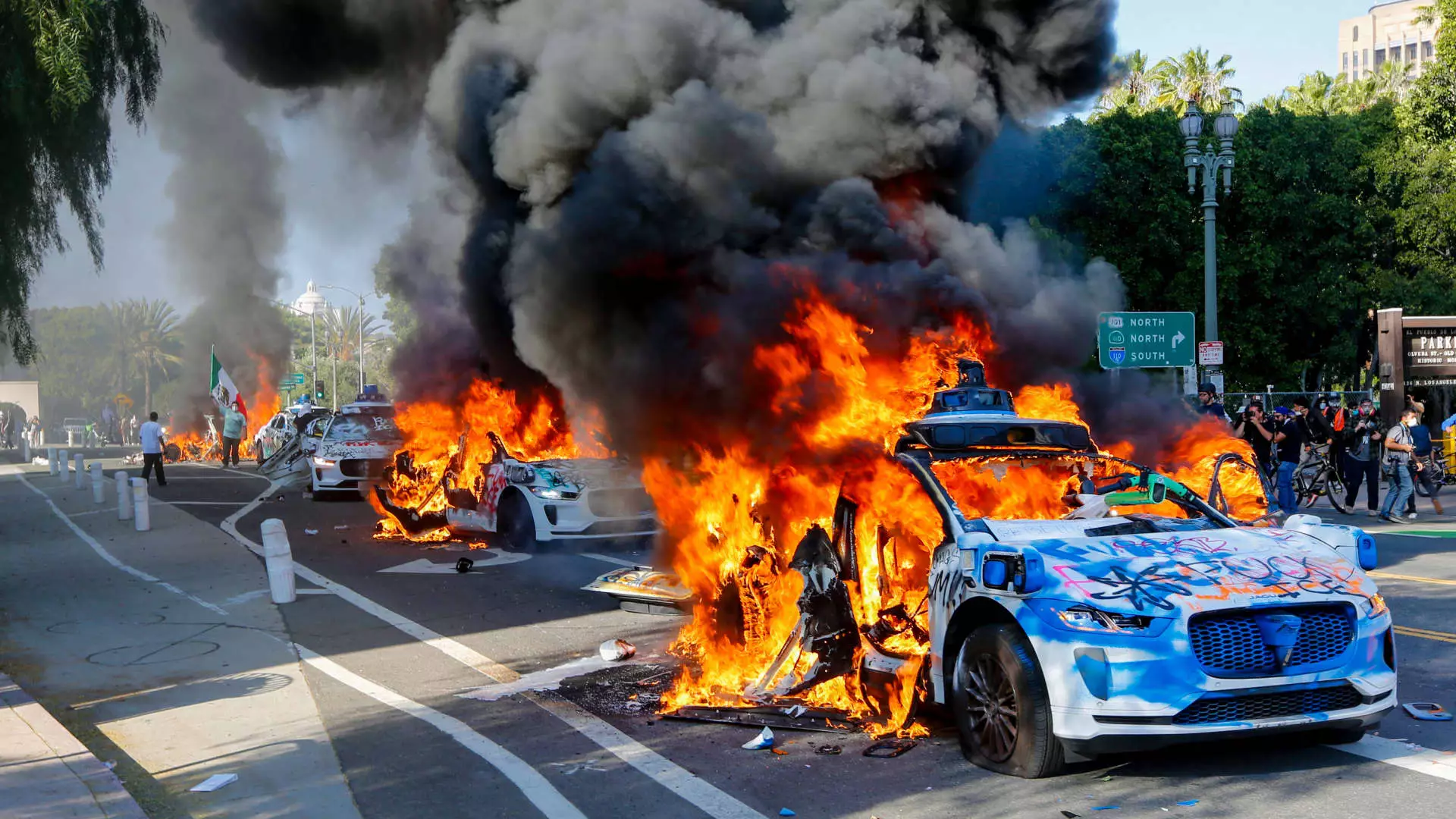Los Angeles, a city known for its glitz and glamour, found itself engulfed in chaos recently as protests against President Donald Trump’s stringent immigration policies erupted into violence. Amid the tumult, autonomous vehicles operated by Waymo, a subsidiary of Alphabet, transformed into unexpected symbols of dissent. As dissenters set ablaze several Waymo cars, the incident became a stark illustration of how technology and social issues collide, raising critical questions about the implications of rapid innovation and community concerns.
The protests were ignited by aggressive raids conducted by Immigration and Customs Enforcement (ICE) in and around Los Angeles, triggering a backlash from the community. While these demonstrations began peacefully, they quickly escalated, culminating in violent encounters with the police. The scene of Waymo vehicles, once viewed as futuristic harbingers of mobility, now ravaged by flames, shifts the dialogue from technological advancement to societal upheaval.
The Role of Technology in Modern Protests
Technology and activism have long had an intertwined relationship, with social media often serving as a catalyst for mobilizing masses. Yet, the sight of those autonomous vehicles being vandalized begs a more profound exploration into the perception of technology. Waymo’s self-driving cabs represent both progress and the complexities that come with it. In an era defined by automation, questions arise about the extent to which societal changes can accommodate, or be disrupted by, innovation.
The deliberate targeting of Waymo vehicles raises intriguing inquiries: Are these cars merely tools of convenience, or are they emblematic of a broader societal discontent? Public sentiment is often wary of advanced technology, particularly when it appears to reflect a disconnect from the very communities that it serves. For many, these autonomous cars exemplify a system that prioritizes profit over people, sparking a visceral response in a time of crisis.
A Backlash Against Inequality
As the fires blazed and smoke billowed, they represented more than just vandalism; they symbolized a vehement protest against a perceived injustice. The anger directed at ICE raids is compounded by a sense of helplessness in the face of systemic inequality. The backlash against Waymo extended beyond a singular moment; it echoes dissent against an administration’s policies that many constituents feel alienated by.
California Governor Gavin Newsom’s plans for legal action against Trump for federalizing the National Guard adds another layer of complexity. The emerging political tensions not only spotlight immigration issues but also lay bare the inconsistencies and conflicts inherent in contemporary governance. The governor’s bold stance against federal intervention positions him at the center of a charged debate about states’ rights versus federal authority in politically diverse states like California.
The Illusion of Safety in Technological Advancement
Waymo’s decision to suspend services following the protests raises critical questions about the safety of innovation in public spaces. On the one hand, suspending operations seems prudent; on the other, it highlights a volatile disconnect between technological deployment and community sentiment. Autonomous vehicles are designed to remove human error from driving, but what about the human element in their reception? Are we prepared for a future where technology thrives in a context of widespread dissent?
The materials from which these vehicles are built also present a silent danger. The Los Angeles Police Department warned that the burning lithium-ion batteries could release toxic gases. This revelation adds a layer of irony: in a world where technology is intended to create safer, more efficient transportation options, its destruction could pose entirely new risks to public health and safety.
The Future: Melding Activism and Autonomy
The collision between automated technology and social activism demands that we reassess how communities engage with innovation. Moving forward, it is essential for companies like Waymo—and other tech entities—to prioritize genuine community outreach and responsiveness as part of their operational philosophies. The technology of the future must align with the values of the communities they serve, or face the fiery backlash illustrated by the events in L.A.
To ensure that innovation does not exist in an echo chamber, companies must adapt to the social climate, acknowledging that technology does not exist in a vacuum. If proactivity is a key to survival, the lesson learned from the flames of protest is clear: listening to the voices of dissent and ensuring that technology benefits society as a whole will ultimately determine the success of autonomous innovation.



Leave a Reply